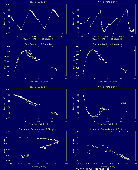
 |
Documentation > SXT Observation Notes > this page |
Image name: Orbit_and_Pntg_Straylight.png (click image to enlarge)
Image size: 19.9340 KB (800x980)
Date submitted: 19-Feb-1995

VARIATION OF SXT STRAYLIGHT These plots display the results of an experiment ran 16-Feb-95 to study the orbital and pointing variation of straylight with and without the ND filter. One 64x64 HR pfi was located on the Al.1 big pinhole in the SE. A second was put on the strong straylight lobe in Be/ND near the LH side of the CCD. The experiment was run at QT/H for two visible orbits. While the dark-corrected Be/ND signal was pure straylight the Al.1 signal was somewhat contaminated with x-rays. This is evident from the time plots at the top which show the Al.1 signal beginning to decrease about 100 seconds before sunset -- the Be/ND signal (as expected) shows no such effect. The Be/ND plot reveals a linear decrease of straylight signal through the orbit of about 2.7%. This is larger than the orbital decrease of roughly 1% that I derived from NB aspect images for the period before filter failure (after I had removed the long term decrease). I am guessing that this variation in sensitivity to visible light is an after effect of the UV flood. The flood now is much more intense than before the filter failure. The Al.1 plot combines this orbital variation with a stronger variation that is dependent upon pointing -- as expected. In this case the limb of the poorly focussed optical solar image falls directly on the pinhole so is very sensitive to pointing. The lower left plot shows no pointing correlation with straylight, all variation here is from the correlation of pointing and time after FMS. This is expected as the ND filter should totally smear out any small effects due to pointing changes. It may be possible to improve straylight correction with a time-since-fms factor but this will require additional calibration. It may not be worth the effort as the effect is minor. L. Acton 2/19/95